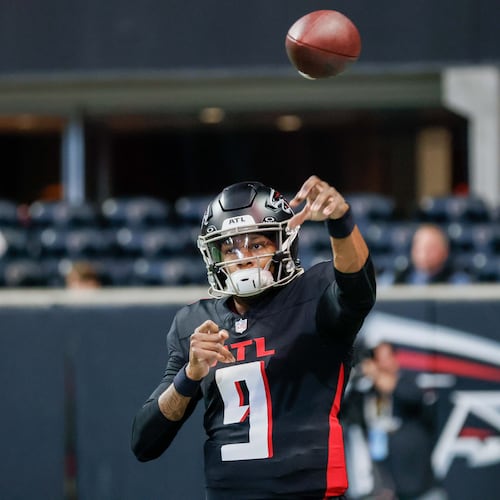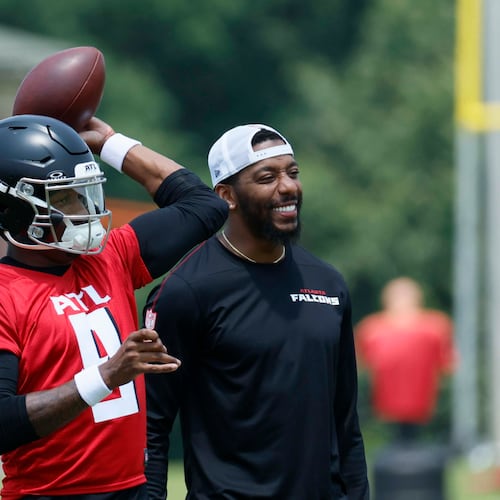FLOWERY BRANCH — Big catches turned into no catches in each of the past two Falcons games. You can blame it on technology.
Harry Douglas had a 21-yard reception overturned Sunday night against the Packers. Roddy White had a 12-yard reception overturned the week before against the Seahawks. Each was falling out of bounds while seemingly making the catch, as was initially ruled on the field.
Challenged by the opposing coach, instant replay showed neither controlled the ball through to the ground. The important third element of a completed pass was shown not to have occurred, with the help of slow-motion views of the play.
New down, same distance.
The NFL rule as it pertains to a completed pass has remained relatively unchanged. However, the adoption of instant replay by the league has brought about an unprecedented scrutiny to the on-field officials rulings on such plays. Add advances in slow-motion technology and high-definition television and officials are sometimes proved incorrect in front of national audiences.
“I think it has created a completely unfair review process for officiating,” said Falcons president Rich McKay, a member of the league’s competition committee. “Officials just don’t have that benefit. They are officiating the game full speed with a ball that is not round and doesn’t bounce in the right direction all the time and in a very complex set of rules given that we have 22 players [on the field] that we have to regulate pretty much every play.
“It’s a very difficult job and that’s why what slow motion, what replay, what all of those things do was add to the burden on how they are judged. Internally, you can ask anyone and they will say that officiating is very good in the National Football League. But externally, because they are judged in such an unrealistic way, everybody one week or the next can say ‘Oh, they missed this. Oh, they should have gotten that.’ That is a lot easier said than done.”
Whether in the field of play, in the end zone or along the sideline, a player much control the ball and have both feet in bounds for a completed pass. According to Rule 8, Article 3, Item 1: “If a player goes to the ground in the act of catching a pass, with or without contact by an opponent, he must maintain and control the ball throughout the process of contacting the ground.”
The rule is not new. The Lions lost their 2010 season opener when Calvin Johnson did not control the ball to the ground on what appeared to be a game-winning touchdown against the Bears. The league re-added language this year to say a player must have control of the ball long enough to make a “football move.”
Most important is the need to get the call correct, McKay said.
“I think replay has its place, on that [White] play, the on-field official focused on his feet and he focused on the catch,” he said. “He didn’t see it all the way through. So he ruled completion, and in his mind got it right.
“But you know what? The TV copy showed you that the ball had come out. I think replay has a place. I don’t think replay means that official got it wrong. He was just in a place that he couldn’t see all of it. That’s going to happen.”
McKay noted the famous ruling of a Vinny Testaverde touchdown in a 1998 Jets-Seahawks game. Testaverde was awarded a touchdown on a 5-yard run in the closing seconds of a 32-31 Jets win. However, replay showed the quarterback clearly was stopped short of the goal line. Instant replay was not yet re-adopted by the NFL and the call stood. The NFL first adopted instant replay from 1986-92. It was discontinued and returned in 1999.
The challenge for the NFL, according to McKay, is to balance technology with officiating a fast-action sport played on the field and not in a replay booth.
“[Late Giants general manager] George Young got it right,” McKay said. “He said ‘Remember that ultimately replay is going to be a real challenge for us from a rules perspective because people are going to want to write our rules for replay. We can never allow our rules to be written for replay because we are a game that is played on the field.’
“That conflict that he described does occur. And it’s a struggle. ... People look at it from a replay perspective, but in reality the game is played on the field. The rules we write as a league, and pass as a membership, have to be looked at from the perspective."
About the Author
Keep Reading
The Latest
Featured



